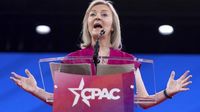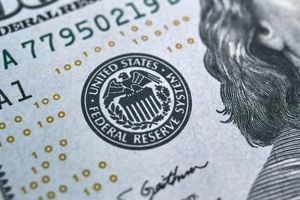The tumultuous 49 days of Liz Truss's premiership have become a focal point in the ongoing discussions about the United Kingdom's fiscal health and political landscape. With her policies, which ushered in significant economic turmoil, having far-reaching consequences, experts now reflect on the implications of her decisions in 2022 and their relevance in 2025.
During her remarkably short tenure, Truss symbolized a radical shift in Conservative policy, moving towards what has now been termed 'Trussonomics.' This term was introduced during a bike ride in 2021 when Andrew Gilligan, a writer and former adviser to Boris Johnson, observed Truss outline her vision for economic reform. In a café by Ladywell railway station, she expressed intentions that many deem the precursor to her controversial policies that led to an upheaval in the bond markets.
Reflecting on Truss’s assertions, Gilligan pointed out the significant fiscal issues Britain faces, noting that any future Tory government needs to address the excessive constraints imposed by fiscal rules and the role of the Office of Budget Responsibility (OBR). "As Sir Charlie Bean, the former deputy governor of the Bank of England, remarked, the UK finds itself in a 'frankly pretty ridiculous position' due to the need for fiscal fine-tuning in managing the OBR forecasts five years ahead," he noted. Such sentiments have echoed through political circles, especially as Labour prepares its spring statement, which highlights the party’s 'iron-clad fiscal rules' aimed at achieving a balanced budget by 2029/30.
Rachel Reeves, the shadow chancellor, has been scrutinizing the implications of the OBR’s projected forecasts. Critics argue that adhering too strictly to these predictions could stifle economic growth and perhaps lead to detrimental cuts in public services or increased taxes. Economist Daniel Susskind saw potential pitfalls in the OBR’s ability to provide accurate growth predictions, suggesting that the exercise of relying on its estimates to guide fiscal policy feels increasingly fanciful.
In the light of Truss's past decisions, current political figures have begun to reconsider approaches towards public finances. The backdrop of Truss's policies had raised alarms across the markets; her aggressive tax-cutting measures were perceived more as recklessness than an economic revival strategy. As Gilligan highlighted, the approach taken by the Truss administration—particularly the way it sidestepped established fiscal frameworks—has stirred lingering questions about how to bolster the UK's economic forecast without creating undue financial instability.
The tension coming out of Truss’s leadership has also seeped into personal affairs. Mark Field, a former Conservative MP, recently divulged details of an 18-month affair with Truss while both were still married, adding a layer of scandal. The Mail on Sunday, reporting on his upcoming memoir, revealed that Truss had navigated not just political landscapes but personal ones too, as she indicated in September 2022 that she would remain with her husband.
Musing over the ramifications of such relationships in political contexts, commentators have begun to explore societal double standards. In light of the affairs involving prominent male politicians, women, such as Edwina Currie and others, find themselves discussing their privacy and how infidelity affects their reputations. While men like Johnson have faced minimal fallout, women often bear the brunt of public scrutiny for similar actions. This has raised questions about gender dynamics within politics and the assumed delineation between personal discretions and public responsibilities.
As the political environment remains highly charged, experts remain concerned about the broader economic outlook. The ramifications of Truss’s economic decisions had left a legacy fraught with instability. Reflecting on the lessons learned amid current economic strategies, independent economist Julian Jessop pointed to Labour's recent tax hikes on companies, claiming they have contributed to a collapse in trust among businesses and consumers alike. He emphasized the precarious balance the government must maintain to avoid tipping into recession.
Discussions on platforms like the Planet Normalm podcast have encapsulated the precarious situation, warning that the economy is on a "knife edge." Investors, wary of Labour's economic policies, perceive the need for restoration of confidence as integral to avoiding further downturns. Jessop's commentary captures the urgency of the moment as Labour leaders prepare to unveil forthcoming fiscal strategies, reflecting upon lessons and failures from the Truss regime.
As the Labour Party inches closer to unveiling crucial economic measures, political pundits and economists alike caution the party against making the same missteps that struck Truss down. Julilege Jessop echoes a sentiment that if policymakers do not navigate these waters carefully, they risk not only losing public trust but diminishing the fragile economic recovery they hope to achieve.
The intertwining narratives of personal affairs and national economic challenges paint a complex picture for Liz Truss's legacy. Her brief period at the helm echoes in contemporary discussions around fiscal responsibility, gender biases, and the need for agile governance in a dynamic economic landscape. Whether her policies will serve as cautionary tales or as lessons leading to renewed strategies remains to be seen as political and economic actors consolidate their positions heading into the coming months.





